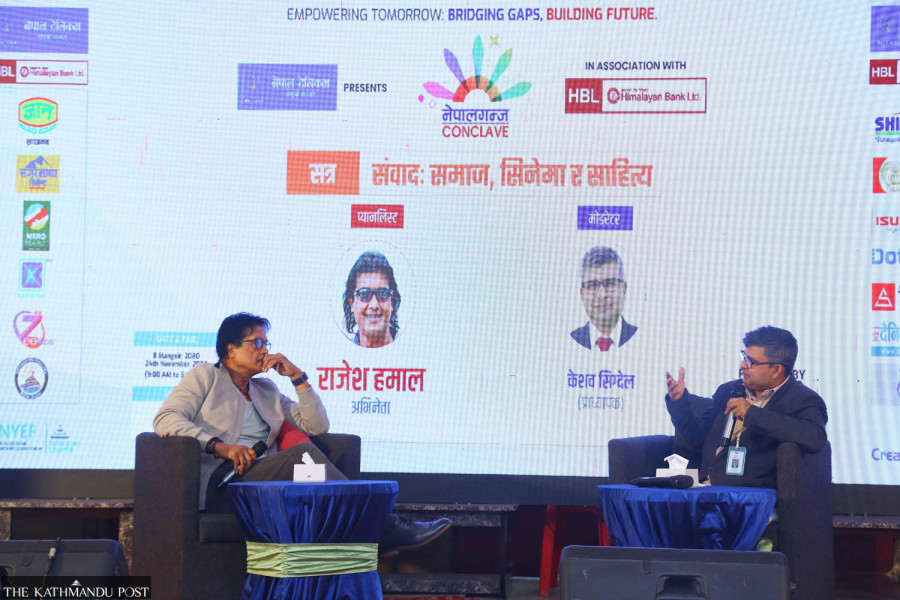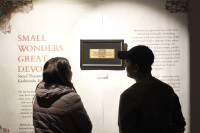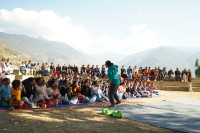Culture & Lifestyle
Shaping perspectives at the Nepalgunj Conclave
The event brought together influential Nepali figures for six insightful sessions.
Rupa Gahatraj
Organised by Creative Hands on the eve of the 9th Nepalgunj Marathon, six sessions of the Nepalgunj Conclave were held on Friday. The event was attended by notable Nepali figures, including Madan Puraskar 2023 winner Bibek Ojha and actor Rajesh Hamal.
In the first session, moderated by journalist Prakash Timilsena, titled ‘Broken link with sports: Education, health and sports’, Principal Secretary of Karnali Province Chudamani Paudel acknowledged that despite changes in sports policies, they haven’t yielded desired results. He highlighted the dominance of politics in sports and the lack of timely amendments since the introduction of the sports policy in 2006.
“The law exists, but its implementation is weak. There’s a lack of necessary resources and an action plan. Budget constraints are evident,” he stated. “Even at the local level, the integration of sports with education is lacking. The budget hasn't produced the desired results. It’s essential to link sports with the economy and tourism,” he added.
Shashi Swar, a school owner, pointed out that schools neglect the qualification standards for sports teachers and lack proper monitoring. He mentioned that when children are encouraged to participate in sports, parents don’t view that positively. “There’s a prevailing negative perception among parents who believe that only students performing poorly academically engage in sports,” he revealed.
Cardiologist Dr Bikas Nepal emphasises the importance of sports for maintaining good health and preventing non-communicable diseases. “Annually, 40 million people worldwide die from such diseases, accounting for 75 percent of total deaths,” he noted, adding that increased screen time has made children more sedentary. Additionally, he also stressed the need for prioritising physical exercise at home, with schools fostering such habits.
Marathon runner Santoshi Shrestha shared her perspective on this, stating, “Sports played a significant role in my school life. I wouldn’t be where I am today without participating in school sports.”
She also believes parental encouragement is crucial for children’s involvement in sports. “My parents didn’t push me because of my academic talent, but I wanted to prove them wrong. However, not every child can do this. Therefore, parents should avoid discouraging their children,” she said.
In the session ‘Nepali fiction: What to read? What to write?’ writer Nayan Raj Pandey shared that not all books are of equal quality. “This is the reality of creative genres. Some books are crafted with passion, but those written merely from desire may lack timeless appeal,” he explained, adding, “For a book to stand the test of time, it must authentically capture the present time and be written with honesty.”
Pandey revealed that creating great literature requires stepping outside one’s comfort zone. Reflecting on his work, he mentioned, “Even in ‘Sallipir’, I endeavoured to write beyond my comfort zone. While some writers label me as a writer from Madhesh, readers see beyond such limitations. We are not confined to a single identity. It’s crucial to broaden our perspectives."
Novelist Bibek Ojha stressed the importance of reflecting on the past and questioning the present. He discussed his work, stating, “In ‘Aithan’, I delved into three wars—Mahabharat, World War, and Nepal’s armed conflict. Readers must know how to choose a book, considering their interests. Not every book suits every reader, and one’s interest guides their reading journey.”
Regarding the lifespan of books, novelist Subin Bhattarai asserted that a good book’s longevity depends on the narrative quality, not merely public discussions. He expressed disbelief in the notion that books’ lifespans have shortened, emphasising that writers are driven to tell stories they feel compelled to write. Reflecting on his experience with ‘Ijoriya’, he noted, “I wasn’t driven by market trends, yet ‘Ijoriya’ quickly became a bestseller after its release in Madhesh.”
Actress Surakshya Pant noted the significant impact of the book ‘Shunyako Mulya’, which portrays the struggles of Karnali women.
“There aren’t many books that address the present time. Some books evoke strong emotions. Bhattarai’s ‘Saya’ is particularly memorable for me,” she remarked. “In cinema, the major challenge lies in writing. Subin dai’s novel ‘Summer Love’ illustrates that even a good book adapted into a movie can falter without a strong team. It underscores the importance of establishing a systematic connection between writers and cinema.”
A discussion on ‘Western Nepal: Entrepreneurship, tourism and employment’ also took place at the conclave. Pradeep Chhajed, ceo of KL Dugar Group, noted a shift in production trends. “In the 90s, Nepal produced 90 percent of the food it consumed; now we only produce 10 percent,” he said, emphasising the need to refocus on agricultural production.
Deepak Raj Joshi, director general of the Confederation of Nepalese Industries (CNI), observed that while Nepal has considerable potential, the inclination to enter certain fields is low. He pointed out the untapped potential in tourism, noting that the global perception often revolves around mountains and adventure activities, and said that the country needs to promote tourism beyond these stereotypes.
In the session on women’s empowerment, mountaineer Purnima Shrestha said that women’s empowerment seeks equality, not opposition to men. She shared how women have the constant burden of having to justify themselves for everything. Similarly, Bhawana Pant, the first pilot of Nepal Airlines’ international flight, recounted her experience of attracting a crowd at the airport, with people coming to see a female pilot.
Miss Nepal World Srichchha Pradhan added that talking about women’s empowerment is insufficient. She stressed the global need to create an environment that respects women’s decisions.




 16.89°C Kathmandu
16.89°C Kathmandu















